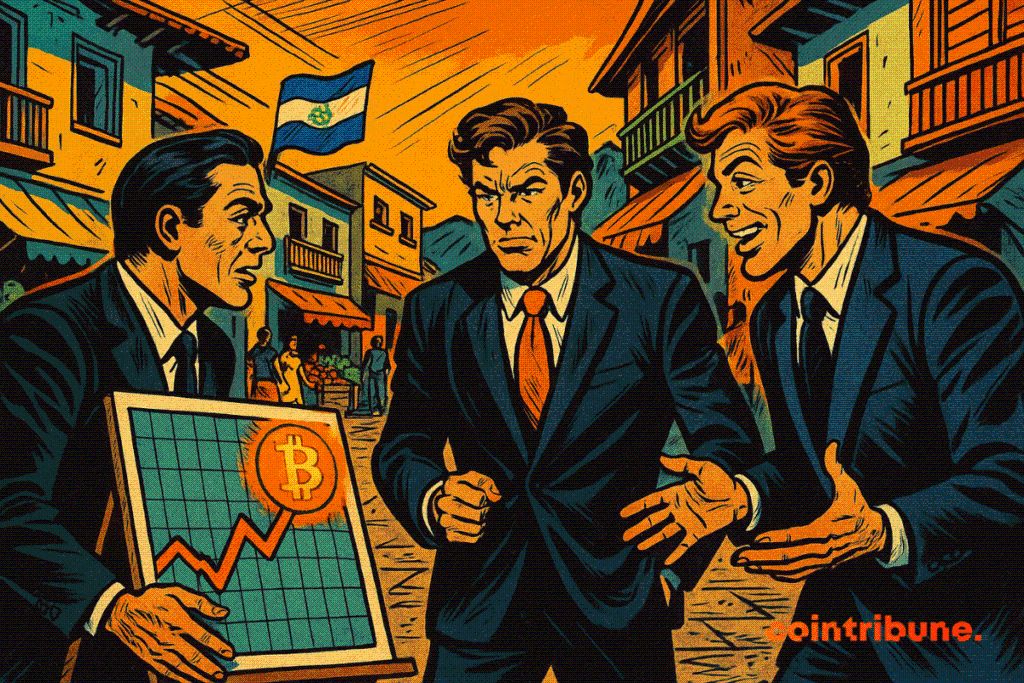El Salvador Paves the Way for Bitcoin Investment Banks
Bitcoin is neither the cup of coffee of the IMF nor that of the bigwigs of international finance. While Washington and Brussels pull out the risk calculator, Nayib Bukele and his team pull out the crypto checkbook. Between boldness and stubbornness, El Salvador pursues its pro-bitcoin policy, even if it means walking a tightrope between financial innovation and institutional pressure.

In brief
- El Salvador authorizes its investment banks to hold bitcoin for qualified investors only.
- A PSAD license opens the possibility to operate exclusively in bitcoin and other digital assets.
- The country develops international alliances, notably with Bolivia and Pakistan, to support crypto adoption.
- National reserves reach 6,262 bitcoins, currently valued at over 730 million dollars.
A tailored legal framework for sophisticated investors
In August 2025, El Salvador, a bitcoin accumulator country, adopted the “Investment Banking Law“, a law that clearly separates commercial banks and investment banks. From now on, the latter can hold bitcoin and other digital assets, but only for “sophisticated investors.”
Juan Carlos Reyes, president of the National Digital Assets Commission (CNAD), summarized the spirit of this reform : “The new law allows private investment banks to operate in legal and foreign currencies for “sophisticated investors,” and to engage in digital assets like Bitcoin with a PSAD license”.
The PSAD license opens the door to 100% Bitcoin banking operations. The official goal is clear: attract foreign capital and make the country a crypto-friendly financial hub. But some observers note that this orientation primarily favors large institutions, not the population.
Bitcoin and crypto at the center of new international alliances
This regulatory shift is not happening in isolation. El Salvador has recently increased international exchanges, particularly with countries sharing the same appetite for crypto-assets. In July, the Central Bank of Bolivia signed a memorandum of understanding with the CNAD to promote the use of cryptos amid a currency crisis.
Pakistani Minister Bilal Bin Saqib, received by Bukele, explained:
Cooperation is based on how emerging economies, both under IMF programs, can leverage technology and other financial instruments for national growth.
These partnerships remind us that behind announcements, there is also a geopolitical battle: that of countries wanting to bypass dependence on dominant currencies and open up to monetary alternatives.
Regulatory challenges and key figures to watch
El Salvador’s bet is not without risks. The IMF has already conditioned its financial aid on legislative adjustments, including removing the requirement for merchants to accept bitcoin. The institution remains vigilant against volatility and money laundering risks.
Max Keiser, Bitcoin advisor to Bukele, however sees the trend as irreversible . Bitcoin is absorbing the 400 trillion dollars of stored value worldwide and reducing the influence of central banks, he estimates.
For now, financial indicators show a rising national crypto commitment.
To remember:
- 6,262 BTC held by the State, worth over $730M at current rates – bitcoin price at $118,000;
- Law adopted in August 2025, PSAD license for bitcoin operators;
- Agreement signed with Bolivia amid dollar shortage;
- Private Investment Bank project with a minimum capital of $50M.
Bitcoin adoption in El Salvador has never been a minefield. Between reforms, external pressures, and a desire to affirm financial sovereignty, the country plays a subtle regulatory hide-and-seek game with large institutions. Bukele and his team move forward by circumventing imposed rules , convinced that the crypto bet is the key to reshaping their monetary future.